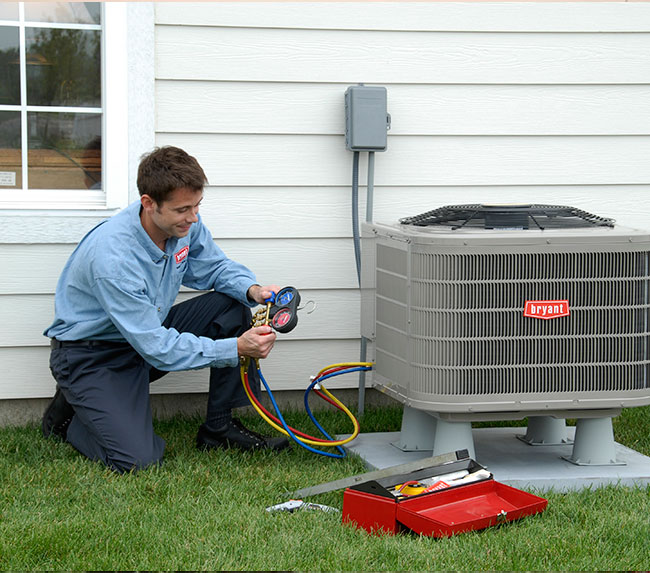Heat Pumps
The name "heat pump" makes complete sense to an HVAC contractor, but it can be a little confusing to most homeowners. To understand how a heat pump works, you have to get your head around one key element of heating and air conditioning. That is that indoor comfort is achieved by moving heat energy. In the summer, your air conditioner doesn't blow cold air into the home. An air conditioning system moves heat energy out!
A heat pump looks and acts like an air conditioner in the summer, but in colder weather it can also provide heat for your home!
The chilled refrigerant from the heat pump is pumped inside to the indoor coil, which is either located in a fan coil or evaporator coil. Before we forget to mention this, a UV lamp is key for keeping your coil mold free.
The fan motor in the furnace or fan coil turns on and pulls air from the home via the return air duct(s). This air is then forced through the chilled coil. As the refrigerant absorbs heat energy from the air, it decompresses back into a gas. The gas is sent back outside to the A/C, and the process repeats.
A heat pump looks and acts like an air conditioner in the summer, but in colder weather it can also provide heat for your home!
How A Heat Pump Cools
In the summer, a heat pump cools your home by compressing refrigerant just like an air conditioner does. Refrigerant is a gas that a heat pump/air conditioner compresses to condense into a chilled liquid. Compressing the gas expels heat energy into the air outside.The chilled refrigerant from the heat pump is pumped inside to the indoor coil, which is either located in a fan coil or evaporator coil. Before we forget to mention this, a UV lamp is key for keeping your coil mold free.
The fan motor in the furnace or fan coil turns on and pulls air from the home via the return air duct(s). This air is then forced through the chilled coil. As the refrigerant absorbs heat energy from the air, it decompresses back into a gas. The gas is sent back outside to the A/C, and the process repeats.
How A Heat Pump Cools
In the winter, a heat pump reverses the cooling process. Even when outside air is chilly, there is still heat energy in it. Now the refrigerant absorbs heat energy from the outside air and the heated gas is pumped inside to the indoor coil where once again, air from the home is forced through the now heated coil.Heat Pump Efficiency
Just like an air conditioner, a Seasonal Energy Efficiency Ratio (SEER) rating is used to measure the efficiency of a heat pump when it is cooling. A Heating Seasonal Performance Factor (HSPF) is used to measure the efficiency when heating.Hybrid Heating
Hybrid heating is accomplished by using a heat pump with a gas furnace. In some areas, especially rural areas where propane is used, a heat pump is much more efficient at heating when winter temperatures are mild. A gas furnace is more efficient when winter temps drop below 50°. With a hybrid heating system, the furnace and heat pump automatically switch off depending on the outdoor temperature.
The image above is property of Bryant® Heating & Cooling
The Comfort Zone
Information about heat pumps
Information about heat pumps




